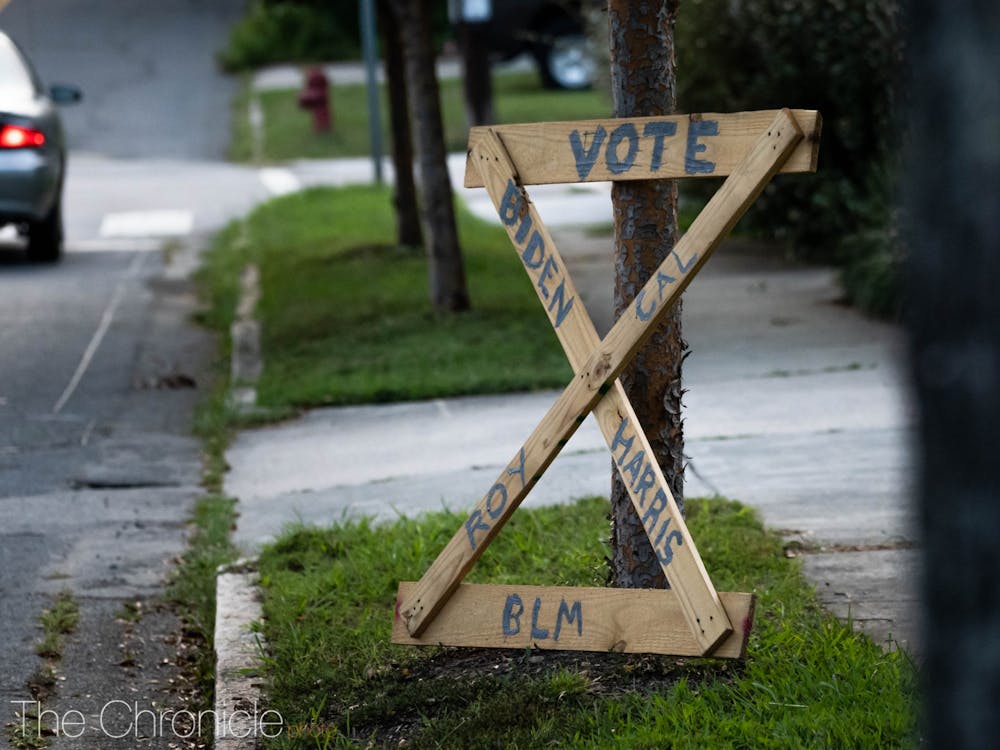With an unprecedented and consequential election just under 50 days away, voting has become a particularly important talking point of discussions on campus.
Between voter power index, mail-in-ballot logistics and the unknown variable of where students will be on Nov. 3, Duke students have lots of questions about where to vote this November.
To register to vote in North Carolina, college students must be physically present in their college community, meaning that many Duke students living in Durham are eligible to register and vote in Durham County. This has left many students with a choice: vote at home, or switch their registration and vote at Duke.
Currently, polling averages in North Carolina show a close race, with the race predicted within half a point in November by FiveThirtyEight—and Democratic nominee Joe Biden leading. And young people will have a particularly large say, according to the Youth Electoral Significance Index created by researchers at Tufts University.
According to that index, North Carolina is the second-most impactful state for young people to cast a ballot in during this election. Because of the unique opportunity that youth voters have to influence the state’s electoral outcome, many Duke students have decided to switch their voter registration and vote in North Carolina in 2020.
Student groups such as Duke Votes, Duke Students for Biden and the Duke International Relations Association are working to help Duke students decide what state or district to vote in and provide them information regarding absentee ballot requests. Such initiatives have played a critical role in the number of Duke students who voted early during the spring presidential primaries and are expected to vote this election season.
“In spring of 2020, 11.4% of registered North Carolinians cast early ballots in the primary,” said Duke Votes Chair Jessica Sullivan, a senior. “Registered 18 to 22-year-olds living on East and West Campus voted early at a rate of 34%, about three times higher than the N.C. rate and higher than any other North Carolina college or university with an early voting site. We are confident that Duke students will continue to vote at record rates.”
An informal survey conducted by The Chronicle—with 60 responses—found that, of those Duke students who plan to vote this fall, 60% are planning to vote in Durham County, while the remaining 40% plan to cast their ballot in another state or district. 98% of those who responded plan to cast a ballot.
The way that Duke students, and Americans as a whole, plan to vote has turned upside down in response to the coronavirus pandemic. 46.7% of Duke students who responded to the survey plan to vote during the early voting period and 48.3% of students expected to vote by mail, while only 5% of students who responded plan on voting in person Nov. 3
Students choosing to cast their ballot in Durham County often cited North Carolina’s status as a swing state in the electoral college and the youth voter power index as primary factors in their decision. Some members in the Duke Class of 2024 have been sharing infographics in GroupMe chats to help their peers make informed decisions on where to cast their ballots come November.
Sophomore Audrey Costley wrote in a survey response that she is voting at Duke due to safety concerns during a pandemic.
“As a North Carolina resident, I voted in my home precinct in previous years; however, due to COVID, it makes more sense to vote locally, without worrying about absentee voting or traveling,” Costley wrote. “Additionally, I think early voting is way more convenient because there is an on-campus voting site. There is no state where my vote counts more and has the most impact than in NC.”
North Carolina is one of the most important states for both parties in the upcoming presidential election. North Carolina has 15 electoral college votes and Donald Trump carried the state by a narrow margin of 3.66% in 2016. For Republicans, the stakes are high, as no Republican has lost North Carolina and gone on to win the presidency since Dwight Eisenhower in 1956.
When choosing whether to maintain their registration at home, students often cited a personal connection to local politics, competitive local or state races and youth voter influence as guiding factors. First-year Abhinav Kolli wrote that he’s “more invested in the local and state politics [in Arizona]; it’s also one of the few states with as much value as North Carolina on the national level.”
At the same time, other students chose to vote at home due to concerns about voting somewhere that is not “home.”
“I believe that I don’t have a right to vote in Durham as someone who does not own property or have family here,” sophomore Akshaj Turebylu wrote. “My family, home, and community are in Dallas, and I would be most directly affected by voting in Dallas. Therefore, I am voting in Texas.”
When asked what issues are driving Duke students to vote this fall, a prevalent answer was an unequivocal “everything!” More specific common responses included Trump’s mishandling of the COVID-19 pandemic, climate change, women’s rights, racial injustice, healthcare, federal court nominations, immigration reform, human rights abuses, gun control, funding for education and preserving American democracy.
Get The Chronicle straight to your inbox
Sign up for our weekly newsletter. Cancel at any time.

Kathryn Thomas is a Trinity junior and new reporter coordinator of The Chronicle's 119th volume. She was previously news editor for Volume 118.

